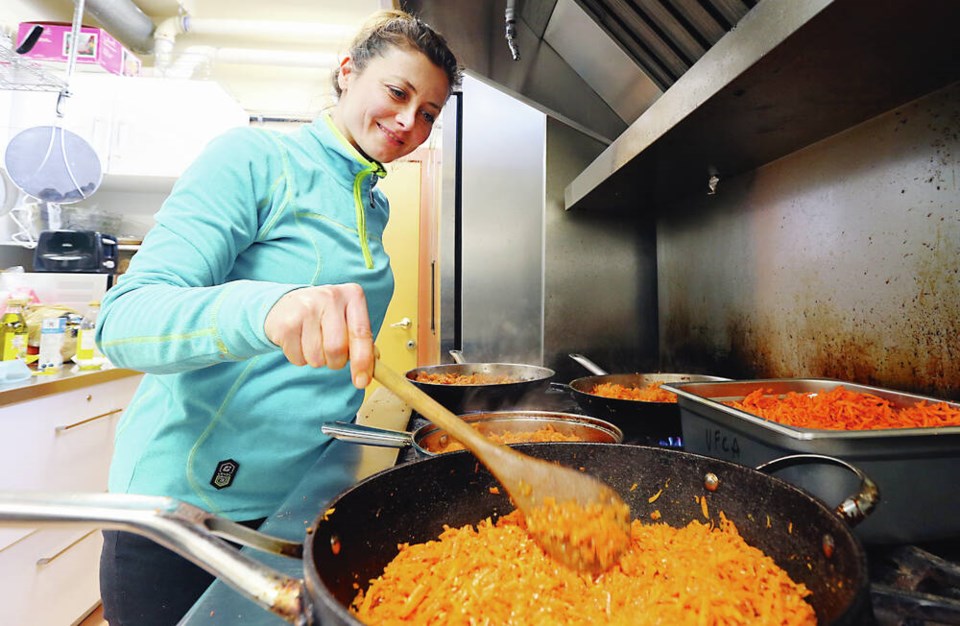Friday afternoon found Deniz Unsal making Turkish comfort food, a salad of navy beans, red onion, olive oil and tahini.
Mige (you can call her Megan) Lynch was doing meatballs in a garlic-tomato sauce with thyme, oregano and cumin, to be served over couscous.
Goksenin Sen was sautéing carrots, garlic and cumin for another dish. The key, she said, is getting the caramelization right before you add the yoghurt.
The food wasn’t for the women’s own consumption. Members of Victoria’s Turkish community, they had gathered in the kitchen at Blanshard Street’s Philippine Bayanihan Community Centre to prepare meals to sell to the public, raising money for earthquake relief.
This is what expats often do when confronted with crises in their home countries, disasters that leave them feeling far, far away from where they long to be. They turn to the food they grew up with, using it as a bridge between here and there.
In that context, food becomes more than a mere fundraising tool. It creates a human connection, something elemental.
“When these kind of calamities happen and you’re far away, you’re kind of helpless,” Unsal said. An assistant professor in the school of communications and culture at Royal Roads University, she immigrated to Canada in 2015. She didn’t lose anyone in the Feb. 6 earthquake that struck parts of Turkey and Syria, but has connections to many who did.
In other circumstances, that’s where she would be, with them. It’s what we all do when friends and family suffer, she said. “You sit with them, you cry with them.” And you feed them. “It’s an expression of how you feel, saying ‘I love you, I care for you, I share your grief.’ ”
It’s hard for many of us to relate to what the women are feeling right now. “My best friend lost everybody in her whole family,” Lynch said.
Sen has a similar story. “My friend lost five members of her family.” They died when a building collapsed, the victims including a couple of newlyweds and a child.
That’s what brought the women to the Bayanihan Centre. In the next room, members of Victoria’s Filipino community were preparing their own cuisine. The two groups were combining to offer a selection of meals, Turkish and Filipino, for the earthquake relief effort.
The bad news is that the deadline has passed for ordering the takeout meals from the Bayanihan Centre. The good is that you can still make a donation there from 11 a.m. to 3 p.m. today (they’ll issue a tax receipt). The Red Cross is an option, too.
The food-based initiative was reminiscent of those that sprang up after Russia invaded Ukraine, a year ago next week. One image stood out from back then: Lia Butler, a 31-year-old with a full-time job and two (soon to be three) pre-school children, pinching perogies in the kitchen of her Colwood home at night. It was tiring work, but Butler, distraught over what was happening in her hometown of Kyiv, said she found making and selling the Ukrainian fare satisfying in a way that merely donating money was not. “I feel like I’m finally physically doing something,” she said last March.
With her third child having arrived, much of Butler’s perogy-making has shifted to her mother, Alla Pavlikhin, who also sells her paintings for Ukrainian relief. It sends a message when you share something that’s personally meaningful as a means of helping someone who is suffering, Pavlikhin said Friday. “It’s what makes us human.” Feeding someone? “It’s like putting a blanket around their shoulders.”
Agie Myhre, the president of the Victoria Filipino Canadian Association, said the same sort of thing. The tragedy might be in a far corner of the world, but food as a common medium (“Everybody likes to eat, right?”) creates a kind of community.
Sen, sautéing her carrots and garlic, concurs: “Food always brings people together.”



